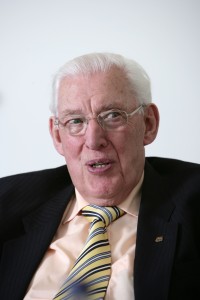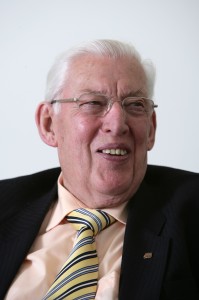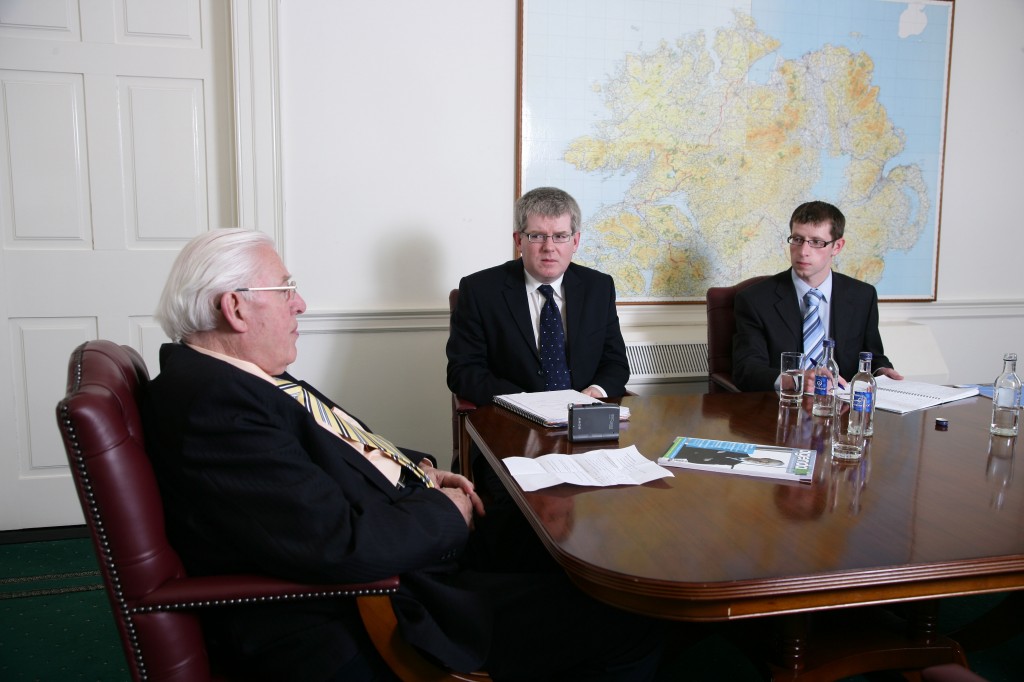Ian Paisley interview: the call of the people
 As Ian Paisley’s term as First Minister drew to a close, Owen McQuade and Peter Cheney met with him to discuss his political career and what he achieved over the past year in office.
As Ian Paisley’s term as First Minister drew to a close, Owen McQuade and Peter Cheney met with him to discuss his political career and what he achieved over the past year in office.
Reflecting on your political career, what was your inspiration for going into politics?
Really it was the call of the people. I never really intended to take up public life but at the time of Terence O’Neill and the way this country was going – very badly and into the hands of our enemies – the people of his constituency [Bannside] approached me and said, look there is a general election coming and you would need to fight this for us. There were two or three other candidates that I thought were suitable and I recommended one of them.
At the last moment he pulled out and they came back to me and said would you go yourself. I said that I would pray about it, think about it, and put out a few pointers to people. And I got a tremendous response. In that election I ran the sitting member who had fought only one election in 19 years, and I maintain that I would have won the election had not a ballot box disappeared and never was accounted for. If that ballot box had have been found I would have been elected. But in six or eight months he resigned the seat and I fought the seat and won it handsomely.
Then Henry Clark, who was MP for North Antrim, which includes Bannside, took my photographs and burned them around the area and I said that I will give you a burning at the next election, and I fought him. I turned his majority of over 30,000 into a majority for myself and into the book of records as the highest number of votes cast for a person against that sort of majority.
So I would say [it was] the call of the people and guidance in providence. I am a Christian and I believe that you should only do things as you are guided by God and I believe I was guided in that.
Looking back over your whole career, what has been your biggest achievement?
I think the biggest achievement was to get the Shinners up here and to give up the real foundation principle of Sinn Fein and Irish republicanism; that the British have no right to be here and ought not to be here. Therefore their police are legitimate targets and you are entitled to shoot them and to shoot members of HM forces. I stood for the principle that if you are going to be in government you have to accept the police of that government and you have to accept the laws passed by that government. Of course that was like revolution to them but they eventually realised there was no other way.
Recently we had Gerry Adams sitting down with the Chief Constable to talk about police protection in West Belfast. That, in my opinion, is a miracle. Our children are not going out in the morning with us not knowing if they will be shot dead or not. That has passed and I think it has passed forever because I don’t see in the Protestant population, or in the Roman Catholic population, any desire to go back to the old bad days. There will be remnants which will give a deal of trouble, and have been giving us a deal of trouble, but the majority of people are with us and I know that as I go around the country. In areas where I wouldn’t have been well received, probably would have been stoned, I am now shaken by the hand and they say: “Keep it up big man, keep it up.”
The Office of the First Minister and Deputy First Minister is a joint office. How have you found working with Martin McGuinness on the day-to-day issues?
I said to Mr McGuinness, we can fight all day and get nowhere and would it not be better for us to try and have a working arrangement with things that we can find agreement on and we go and do them, and things that we haven’t agreement on we keep talking about?
Of course I am a unionist and am not going to change and he is a republican and he is not going to change. But I must say we have solved quite a number of very difficult positions that have arisen in the past year and we have resolved them well. People can see that in spite of all the anti-democratic ingredients in this present settlement that we have this time, there is – if people have goodwill and determination – a way out of our troubles and we must take that way and that is what we are trying to do.
I must say I that I have been well received in the South of Ireland and they know I haven’t in any way changed my views, and the fact they invited me down to the Boyne twice proves they were quite happy with what I said to them. I didn’t pull my punches and they didn’t pull theirs. I think we are making progress.
 What practical differences has devolution made compared to direct rule?
What practical differences has devolution made compared to direct rule?
It has been a wonderful thing. We have direct access to people that can make decisions and that is the very basis of democracy. If I can get direct access to the man that is going to make a decision that affects me, my wife, my family and my future and we have got that restored. The Executive has done a magnificent job of work, by number one; giving a lead to the people and showing them it is possible to have a government in Northern Ireland without unionists selling their birthright and without republicans giving up their republicanism.
What has been the highlight of your time as First Minister?
There have been many wonderful happenings, wonderful things said and wonderful things done and it would be very hard to point one out. One highlight in the year was to get the magnificent investment conference. We were told we might get 30 people to come over but we got over 160 people who have their hands on the wheels of power and much investment will come bringing jobs. I think that is a marvellous thing and we need to keep at that. If we can do that, a prosperous Northern Ireland will help our people to stay at home. We have lost a lot of bright people and I believe we are getting them back slowly but surely. I would say the greatest thing is the day-to-day peace in the country.
What has been the hard part, the biggest challenge?
There has been a challenge before us today of education and that is a challenge we have to face up to. There was a challenge of the British government going to push on us their idea of devolving policing quickly, which I think that we surmounted. If we are going to have devolution of policing powers it will have to be in an ordered way and in a way that doesn’t give any ground for any section of our community to be afraid.
At the moment the fears of the Protestant and unionist people are that if we have devolved policing powers it could be that former paramilitaries could have some control over the police, and that is something they fear and don’t want. I believe that we will eventually have devolved policing but it will take time. None of the unionists are against having control over their own police force – they would like to have that – but it is control and not dictation to the police.
We focus very much on government and the workings of government. In your experience what are the essential elements of good government?
In our situation because of this ‘jointery’ in it, good government is that people realise that they won’t get everything they want, but there is no need for them to surrender that which forms the ethos of their political beliefs. We have made progress over the past year and we can make more progress.
 You won the Parliamentarian of the Year award last year. What makes a good parliamentarian?
You won the Parliamentarian of the Year award last year. What makes a good parliamentarian?
What makes a good parliamentarian is to get the votes. [In that competition] it was a vote in both Houses. Many men and women voted for me that wouldn’t agree with me. They said: “Well this man has done something. He has made sacrifices himself, withstood a lot of abuse from various quarters but he has delivered the goods. Therefore we think it is only right, while we don’t agree with him we do agree he has done a good job.” I think that to have to win that not by argument but by acts. Northern Ireland, and its people, have come out well because we have acted upon what we said we would do.
In the House of Commons is there any particular MP you admire as a parliamentarian?
I have had many friends since I was elected in 1970, on both sides of the House. It is strange to believe that Tony Benn and myself are good friends. We have fought together on the floor of the House on things we have agreed on. A strange coalition you might say. He is a man I admire, although I don’t agree with his views on Northern Ireland – of course he knows that and we exchange our salvos from time to time. When I celebrated my 80th birthday, the Speaker of the House had a birthday party for me and Members from all parties attended, including several former Secretaries of State that I had many a round with in the arena. They were all there and all paid their tributes which I was very grateful to hear.
On a similar vein, you have dealt with several Prime Ministers, you have challenged several Prime Ministers, from Heath to Brown. How have you found them?
They are a mixed multitude. Tony Blair is a tremendous man at putting on an excellent act. He is one of the best actors I have seen – and I’m not saying this in a wilful way. He is a very clever man. He fought very hard to get peace for us but he fought by thinking that half measures and by having arguments over sentences – changing a word here and putting an adjective there that you could get unity. That didn’t work. I remember one day he rang me seven times with different sentences he wanted me to agree to and I said: “Go back and tell your friends in Sinn Féin that there is one thing I want and that is a simple declaration that you agree with the police, you agree with the courts and you agree with the government and you want to serve in the government and if you go into government you will pay it the respect it needs.” And we eventually got that.
Moving onto Europe. Do you have a continued interest in it and have you changed your views on Europe?
I believe that Europe has a place but Europe has changed greatly. When I was there, for 25 years, I found a great change. It [the European Parliament] ceased to be a debating chamber. The general assembly was a farce. I think some of the democratic foundations have been torn up and I don’t like the way they change the laws without putting them to the people. After all we are British and the British Parliament should have the final say in changes to the law as should the parliaments of the other countries.
What now for Ian Paisley? How will you find life on the backbenches?
I have sat on the backbenches all my life. So it will be like going home.
Is there a book in it?
I would like to write something on the negotiations. I would like to put it from the point of view that I have had and has been endorsed by the majority of voters here. I think that has to be written up.
One final question. What do you think your legacy will be?
I think that people will judge me as I was. I have never tried to hide anything from the people of Northern Ireland. I’m a plain man. They often say that you don’t need a dictionary to know what I’m saying. It’s plain stuff. I have made a few mistakes as we have all done but the principles I embraced in the early days I am unrepentant.
I believe in the unionism I believe in and I got from my father, who was an old UVF member and follower of Edward Carson, and I believe those principles are good and have brought us through so far and will bring us through to the end. There are things done today that were done by our fathers and that is the development of a nation. You can’t live in the past, you have to live for the future and that is what I try to do.
I think the proof of the pudding is in the eating. To look at Northern Ireland today as it is and to think I am sitting here and I have just had words with my deputy before he left the building – it’s a miracle. If you had told me that two or three years ago I would have said you better go and get your head examined.





